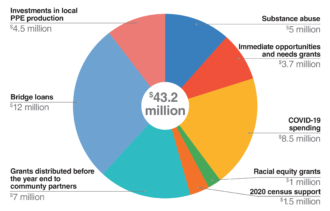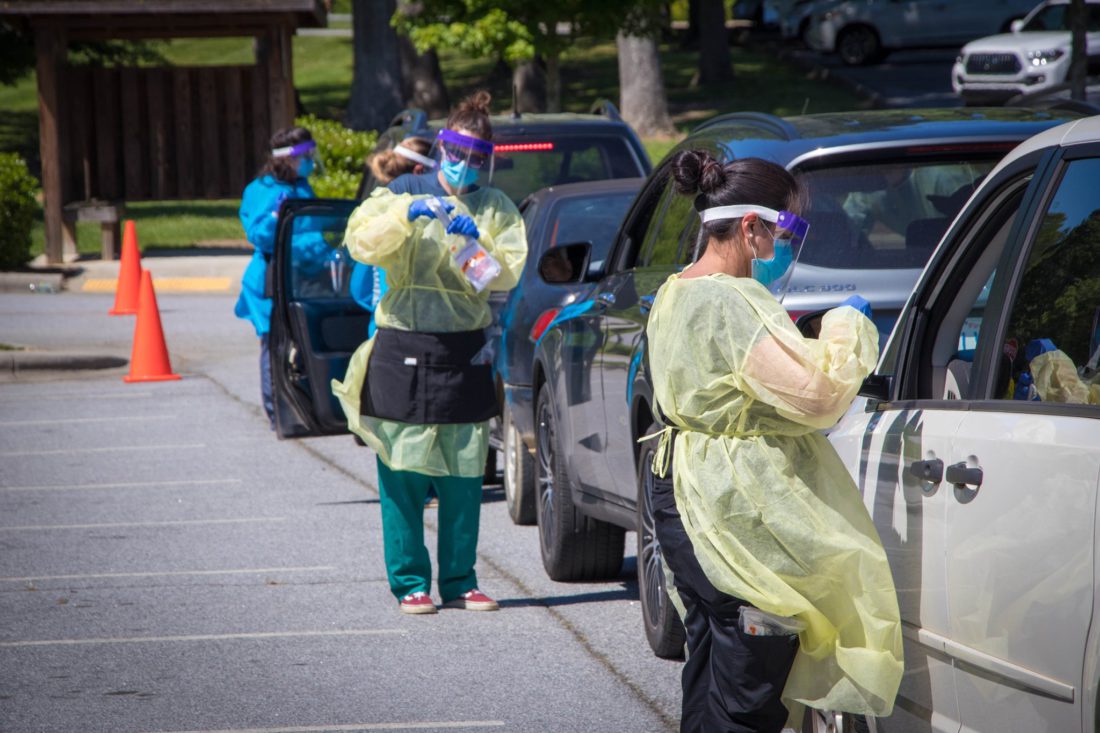All new organizations experience growing pains. There are priorities to set, employees to hire, decisions to make. Leadership teams learn — and adjust.
Dogwood Health Trust, the foundation created in 2018 to manage proceeds from the $1.5 billion sale of Asheville’s nonprofit Mission Health System to HCA Healthcare, is no different, said board member Casey Cooper. Amid internal upheaval following the sudden departure of CEO Antony Chiang and appointment of interim leader Susan Mims, the COVID-19 pandemic and economic uncertainty, the foundation held its first annual meeting virtually on Oct. 28.
Cooper, along with DHT board members Janice Brumit, Dawna Goode-Ledbetter and Sarah Thompson offered statements and answered questions from moderator and UNCA professor Darin Waters. But one query seemed to weigh on most participants’ minds: As one of the largest foundations per capita in the world, what exactly has Dogwood been up to?
Where’s the money?
In its first year since the Mission sale, the foundation awarded more than $40 million in grants and investments, said Brumit, the board’s chair. That amount, she acknowledged, fell shy of the $50 million the organization had hoped to allocate throughout its 18-county Western North Carolina service area.

“COVID-19 set us all back on our heels. We had to stop and pivot to help mitigate COVID, but I feel that $40 million is still a pretty respectable number,” Brumit said. “We plan to do better next year.”
The foundation spent $8.5 million to respond to COVID-19 by purchasing tests, personal protective equipment and internet hot spots to help students access remote learning. An additional $4.5 million was invested in area companies that shifted production to PPE and hand sanitizer, including McDowell County-based Kitsbow Cycling Apparel and Asheville-based Cultivated Cocktails, Brumit said.
In the spring, DHT awarded $3.7 million in immediate opportunities and needs grants to 259 nonprofits and government agencies, with the average award totalling $14,600. And in September, the foundation committed $1 million for racial equity community grants to benefit “historically underfunded” organizations serving Black and Indigenous residents and other communities of color.
Roughly $1.5 million went to WNC counties and nonprofits to incentivize participation in the 2020 census. Other grants and community investments accounted for $7 million, while about $12 million was allocated as bridge loans for businesses applying for federal paycheck protection funding, Brumit continued.
DHT has committed to spend $5 million annually over a five-year period to address substance abuse as part of an agreement with N.C. Attorney General Josh Stein and the N.C. Department of Health and Human Services. The foundation is on track to meet that $5 million quota by the end of the year, Cooper said, noting current investments in needle disposal sites and naloxone kits to help reverse opioid overdose.
By law, private nonoperating foundations must distribute 5% of their net investment assets annually. When all of Dogwood’s $1.5 billion in assets come under foundation control in 2022, this will equate to roughly $75 million; Brumit clarified that the 2020 requirement falls closer to the $40 million the foundation has already allocated but did not give an exact number.
Behind the veil
The Oct. 28 annual meeting was the first public update from the foundation since March, when local news outlets were invited to a press conference with Chiang to discuss the DHT’s COVID-19 response. A second media availability was scheduled for Sept. 23, but was canceled minutes after news broke of Chiang’s departure on the same day.
The foundation has been criticized for a lack of transparency, Waters noted as he asked panelists about their approach to sharing information and updates. “We have intentionally and repeatedly engaged with community members,” Brumit responded, adding that listening sessions with community members and partner organizations are ongoing.
“Part of the reason we’ve been so quiet is because we’re so busy,” Brumit shared at the start of the meeting. The same sentiment was stated almost word for word by Goode-Ledbetter an hour later: “Starting a foundation from scratch in a non-pandemic is hard. Doing it in a pandemic is harder. If it seems like we’re being more quiet about things, it’s because we’re busy.”
And Thompson asked for patience as the trust continued to develop its communication strategies. The board was only a few sessions into strategic planning when the COVID-19 pandemic began, she explained, and decided to focus on responding to the virus instead.
Concerns with the DHT’s transparency, however, existed long before the pandemic. In late 2018, local nonprofits blasted the trust’s initial board as consisting largely of Mission insiders, and some feared retaliation for airing their concerns. Brumit admitted to Xpress in February 2019 that “we probably should have invited the press” to the trust’s first ostensibly public event in September 2018, which only included select nonprofits. Few details about Dogwood’s financial management were made available after the trust accepted its first assets in 2019.
When asked by Waters about the circumstances surrounding Chiang’s departure, Brumit stayed tight-lipped. “With respect to why, there is not really anything else we can share at this time,” she said. “In terms of direction, sometimes a new organization needs a change or shift in style for the work in front of us.”
New directions
Housing, employment, education and health and wellness will be the foundation’s four strategic priorities for the next decade, Brumit announced. During that time, the board hopes to build over 5,000 units of affordable housing, create at least 5,000 jobs to diversify the regional economy, shrink the opportunity gap in area school districts and address the opioid crisis and substance abuse. Diversity, equity and inclusion initiatives also remain a top priority, Goode-Ledbetter said.
“We see these areas as four roots of a mighty tree that come together to make a strong trunk and create branches that grow fruit for everyone,” Brumit said.
Mims will begin her new role as interim CEO in December. She comes to DHT from the Mountain Area Health Education Center, where she chairs the newly established Department of Community and Public Health at UNC Health Sciences at MAHEC. The search for a permanent CEO will begin shortly, Brumit said. “We’re very glad to have an interim with a deep knowledge of the community,” she shared.
DHT’s annual report, containing a detailed breakdown of all funding allocations, will be released at the end of the year.



Before you comment
The comments section is here to provide a platform for civil dialogue on the issues we face together as a local community. Xpress is committed to offering this platform for all voices, but when the tone of the discussion gets nasty or strays off topic, we believe many people choose not to participate. Xpress editors are determined to moderate comments to ensure a constructive interchange is maintained. All comments judged not to be in keeping with the spirit of civil discourse will be removed and repeat violators will be banned. See here for our terms of service. Thank you for being part of this effort to promote respectful discussion.